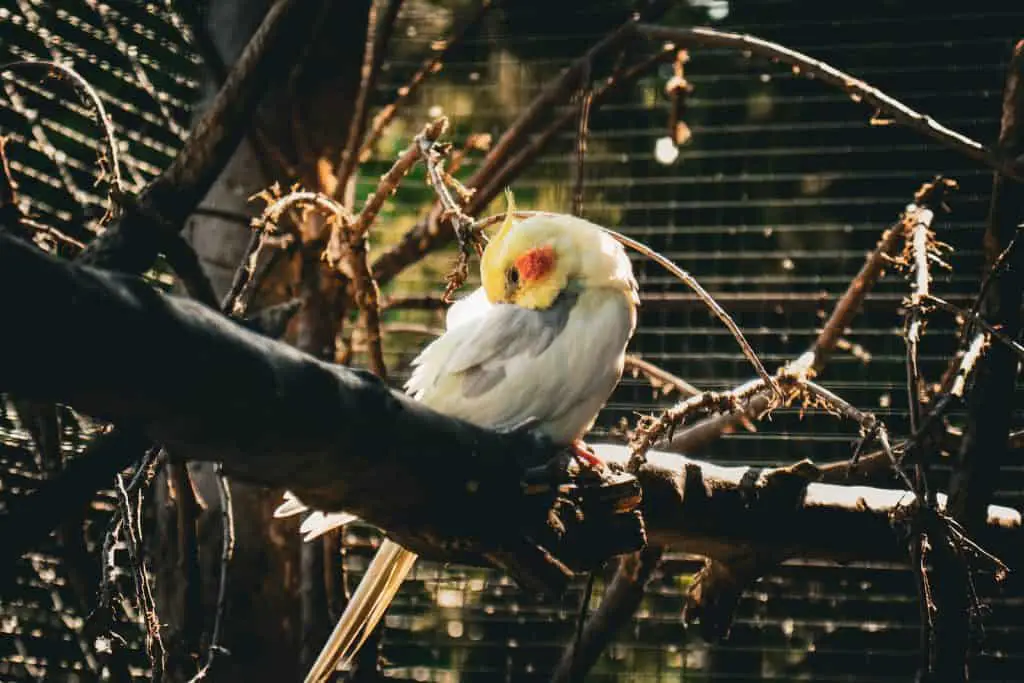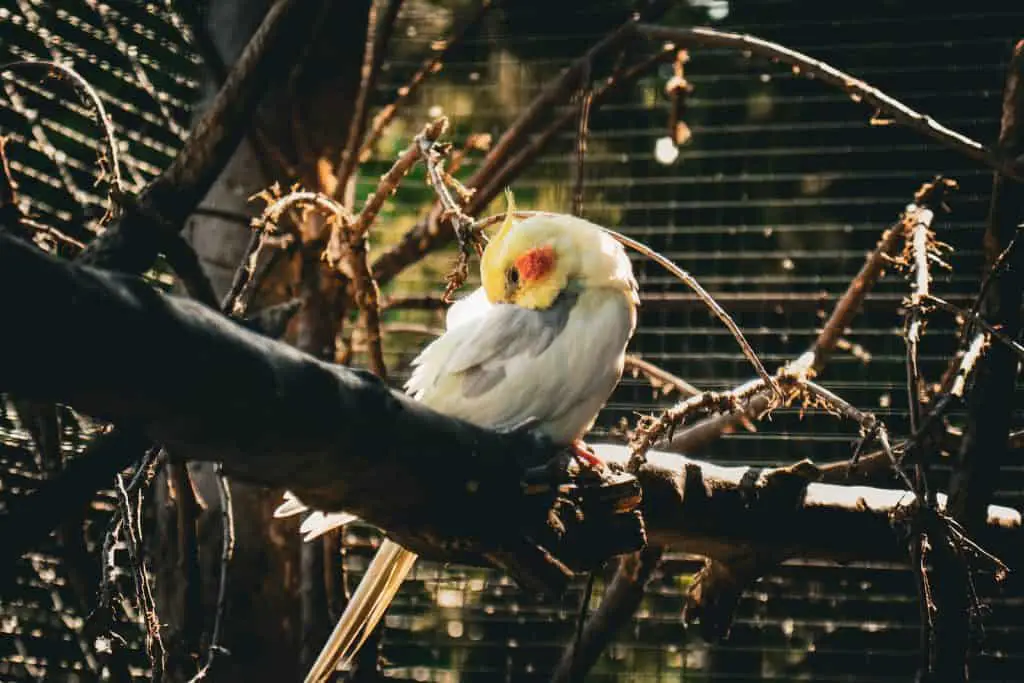Why do cockatiels eat their poop? This question doesn’t have a straightforward answer, as there could be several reasons why your cockatiel like to eat poop. It could be that your bird or parrots eat their own poop is simply curious and exploring its environment, or it might be experiencing some nutritional deficiency that is causing it to seek out alternative sources of food.
This post will go through each of these roots causes and offer advice on how to handle the situation why your parrots eat poop.

Why Do Cockatiels Eat Their Poop?
Nutrient deficiency
Cockatiel eating its own poop because of nutrient deficiencies. One of the most prevalent issues among pet parrots is malnutrition. Cockatiels are unique among birds in that they may be able to detect when they are lacking in nutrition. A tiel may eat his feces since some nutrients are lost through defecation, allowing them another opportunity to be absorbed. Although this isn’t the greatest idea because we’ll discuss later, it’s actually quite clever.
Nutrients contained in bird poop
Choline is an organic compound found in bird droppings that helps to build cells, metabolize fat, and maintain a healthy nervous system and brain function.
Whole grains, vegetables, fruits, and nuts are all good sources of choline. A tiny amount of choline is also produced naturally by a healthy bird’s body. Traces of important nutrients such as vitamin C, vitamin B, and amino acids, as well as other elements necessary for feather growth and maintenance.
Why your bird may have a nutritional deficiency
Because the diet of a cockatiel is not well-balanced, he may have a nutritional deficiency. This happens a lot in older cockatiels. While advances in psittacine nutritional requirements knowledge have been made recently, many commercially available mixes still fall short of achieving that goal.
To prevent cockatiel malnutrition, TOPS, Harrisons, or Roudybush should be fed as these are high-quality and science-based pellet-like foods. Birds can also be picky eaters so feeding a variety along with fresh vegetables, sprouts, whole grains, legumes and fruit is best. A limited amount of seeds and nuts is okay too.
However, nutritional deficiencies are not always due to an incomplete diet. Stress, illness, a lack of natural light, or even a temporary vitamin or mineral imbalance can all prevent your bird’s food from being absorbed efficiently.
Should you give your bird supplements?
If your bird appears to be eating his own feces due to a lack of nutrients, you may be able
to give him dietary supplements. However, always check with your vet before doing so.
Too much of a vitamin or mineral can cause harmful health problems in birds because they are very sensitive creatures. The best ways to provide additional nutrition are:
- Offer a varied diet that includes natural whole foods and high-quality pellets.
Boredom
Another reason a cockatiel might consume his feces is that he does not have enough toys and foraging options, especially if he lives alone. Cockatiels in the wild spend a significant amount of time flying from one site to the next and searching for food. Their meals in captivity are generally served to them in a dish, and eating their fill takes only a few minutes.
Desire to forage
Your cockatiel may eat his poop from the bottom of the cage to entertain himself and satisfy his desire to forage on the ground. However, you can discourage this behavior by providing other outlets for your bird’s foraging instincts and increasing the enrichment factor of his lifestyle.
Cockatiels love to play with foraging toys made from natural materials that they can chew and shred. Try giving your tiel a clean piece of newspaper with seed or leafy greens sprinkled on it for an extra fun activity.
Be sure to clean your bird’s toys regularly, and before they start to spoil. Your bird might also enjoy foraging for leafy greens or millet spray clipped to the side of their cage.
Lack of enrichment
If your cockatiels don’t get enough stimulation or exercise, they’ll find activities to keep themselves occupied. Even so, if they aren’t provided with entertainment, cockatiels will seek methods to amuse themselves. It can be negative, damaging, and even dangerous in the case of screaming, plucking, and eating droppings. Male cockatiels are more likely than others to overreact as a result of their frequently overreacting behavior.
If your cockatiel is eating his feces as a result of boredom, offer him foraging materials to keep him occupied and make lunchtime last longer. Also, make sure your bird has lots of fun toys to play with and spends time out of the cage with you.
Why Do Cockatiels Eat Their Poop: Other reasons
In an effort to clean up its perch or cage area, a cockatiel may eat or crumble dried feces. In this scenario, the bird is typically just grabbing and crumbling any waste that gets trapped to the surface it’s attempting to clean up and dropping it on the floor rather than eating it. A cockatiel not fully digesting its food might also ingest its droppings if whole seeds have gone through. If you notice undigested seeds in your pet’s droppings, it’s time for a vet visit.
Finally, stress might play a role in any of the above causes for cockatiel feces eating. A nervous or worried bird will frequently attempt to relieve its tension through unusual activities such as picking at or crumbling droppings.
If your cockatiel has started eating his own feces recently, try to remember if anything major happened in his life around that time that could be causing him stress.
How to stop your cockatiel from eating poop
You know that it’s dangerous for your bird to eat its own poop as it might contain harmful organisms, but your bird doesn’t. Droppings are a common carrier of bacteria, parasites, and disease, so while your bird might not get sick immediately from consuming its own feces, it’s still a behavior you should discourage. There are several ways you can do this with cockatiels.
Deal with the underlying issue.
If you want a happy and healthy bird, it is important to bring them to an experienced avian vet to check for any underlying issues. Make sure the parrot’s diet is nutritious and balanced, so they can get a few nutrients and keep an eye out for other signs that your bird may be bored or stressed.
Keep fresh poop away from your bird
You can also reduce the opportunities your bird has to eat his own poop by keeping it away from him as much as possible. Many bird cages come with a wire floor that allows your bird’s droppings to fall through to a tray below, which keeps them out of reach.
However, some droppings may get caught to the wire, perches, and toys, necessitating you to use a wet cloth or paper towel on a regular basis to clean these items. Also, keep your bird away from the poop by cleaning the area around his play stand or other places he visits on a regular basis.
Foraging opportunities and enrichment
If your bird is eating feces just for fun or because he’s bored, the best approach to address it is to offer him something different to chew and play with. Many cockatiels like tearing paper, wicker, cardboard, and other natural materials into pieces. To keep your bird occupied, put snacks in foraging toys that he can find.
Why Do Cockatiels Eat Their Poop- Bottom Line
Although it may not seem harmful, eating poop can lead to your bird contracting disease and parasites. Additionally, this behavior is often indicative of other problems like nutritional deficiencies or stress.
While a cage floor and frequent cleaning of your bird’s play area may help keep your tiel from consuming his feces, it’s also important to address any underlying concerns before they have a detrimental influence on your bird’s health and well-being.
Be sure to explore the following articles. Each piece provides valuable insights into various food items and their suitability for your feathered friend. Discover whether bean sprouts are a healthy choice for your cockatiel and learn about the implications of allowing your cockatiel to nibble on newspaper. If you’re curious about the safety of feeding leeks to your bird, don’t miss the detailed discussion in this article. For those wondering about offering sweet treats, find out whether ice cream is an appropriate snack for your cockatiel. Finally, discover the benefits and potential risks of feeding jackfruit to your beloved pet. These resources are essential for ensuring your cockatiel enjoys a balanced and safe diet.
- Why Is My Cockatiels Poop Watery
- Why Is My Cockatiel Vomiting
- Why Is My Cockatiel So Quiet
- Why Is My Cockatiel Shaking
- Why Is My Cockatiel Losing Feathers
- Why Is My Cockatiel Laying Eggs On Bottom Of Cage
- Why Is My Cockatiel Eating So Much
- Why Is My Cockatiel Chirping So Much
- Why Does My Cockatiel Scream When I Leave The Room
- Why Does My Cockatiel Nibble Me
- Why Does My Cockatiel Keep Yawning
- Why Does My Cockatiel Hang Upside Down
- Why Does My Cockatiel Fly On My Head
- Why Does My Cockatiel Face The Wall 6 Reasons
- Why Does My Cockatiel Bob His Head
- Why Does A Cockatiel Stand On One Leg
- Why Do Cockatiels Sing
- Why Do Cockatiels Hiss
- Why Do Cockatiels Have Crests
- Why Do Cockatiels Eat Their Poop
- Why Do Birds Rub Their Beaks
- Why Do Birds Poop In Their Water
- Why Cockatiels Like Head Scratches
- Why Cockatiels Grind Their Beaks
- Why Choose A Cockatiel Bird As A Pet
- Why Are My Cockatiels Tail Feathers Falling Out
- Why Are My Cockatiels Fighting
- Why Are My Cockatiels Feet Warm
- Why Are Cockatiels So Dusty



